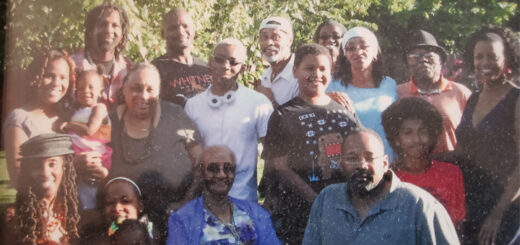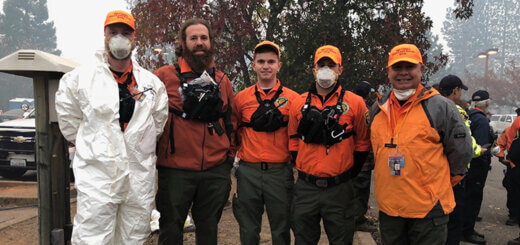Merced caregiver finds joy in little moments
Aimee Mattson and her wife Val Geurin have been caregivers for Val’s mother, Bonnie for over eight years. Aimee and Val have found ways to educate themselves about dementia, manage the challenges, and appreciate moments of joy.

A loving farm wife
Before Alzheimer’s, Bonnie was a firm but loving woman who enjoyed coloring and was a great cook. “She always had time for the kids,” said Aimee, “and made sure there was enough room on her lap for every grandchild.”
Bonnie was the kind of woman who bought Christmas gifts in advance and ran the household. “She raised her own kids, her grandkids and was a foster parent,” said Aimee. “She was and still is a stone cold, I’ll knock your block off, farm wife. When she says, “˜this is how it’s going to be,’ then this is how it’s going to be.”
Moving across the country
In 2008 Aimee and her wife Val were living in Minnesota. They had started noticing that Bonnie was retelling stories during the same phone call.
When Aimee was laid off due to the recession, they saw an opportunity to move closer to Val’s family and lend their support. However, they weren’t welcomed with open arms. “It was kind of arrogant on our part,” said Aimee. “We thought we would ride in and save them.”
Difficulty getting a diagnosis
The decline in Bonnie’s health progressed slowly, until Bonnie had triple bypass surgery 2012. When she woke up after surgery, her ability to remember things had gotten much worse.
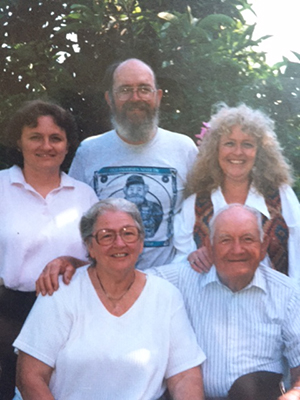
“We were alarmed,” said Aimee. “We were trying to piece together what happened. We asked the doctors for help while we were at the hospital. They insisted it was the anesthesia which can take weeks to clear up, but I was skeptical.”
Aimee works at an assisted living facility and sees dementia patients daily. She easily recognized the signs in her mother-in-law and began fighting to get a diagnosis.
“The fog never cleared,” said Aimee. “She kept losing her keys and could no longer make plans. I called her on Christmas to ask when they were coming over and she had no idea what I was talking about or that it was even a holiday.”
Stepping in to help
With her father-in-law’s permission, Aimee and Val began to help with Bonnie’s healthcare. Aimee said, “It was alarming how hard it was to get them to give her a diagnosis.”
Bonnie’s doctors didn’t want to do the diagnostic tests and were hesitant to believe what Aimee and Val were telling them. Finally, in 2015, Bonnie received a dementia diagnosis.
An unexpected death
Tragedy struck six months after Bonnie’s surgery, when Aimee’s father-in-law died unexpectedly. He had been working in the yard and fell. His visit to a doctor led to a lung cancer diagnosis.
After he died, Aimee and Val realized everything he’d been trying to manage. Bonnie’s memory loss was much worse than they thought. They didn’t realize just how much he had been covering for her.
“He loved Bonnie so much, he couldn’t limit her abilities,” said Aimee. “He’d never written a check, because she ran the house. He worked his tail off and then he had to learn how to pay the bills, shop and manage the house.”
Val gets to live her dream
Bonnie couldn’t live alone, so Val and Aimee welcomed her into their home. “We’re parents to four kids,” said Aimee. “Our youngest is three. Val stays home with the kids and her mom.
“It’s a lot of work. If it were me, I would say this is too hard, but for Val, it never feels hard. She always dreamed she would get the opportunity to take care of her parents.
“Every night Val says to her mom, “˜I can help you with that.’ It’s always in the same tone and cadence every night. I couldn’t do that. Taking care of your parents is tough.”
Teaching their kids compassion
One of the positive things that has come out of this whole experience is showing Aimee and Val’s kids how to be better people. “We sat down and talked with our kids about what was going on with Grandma and how they can help,” said Aimee. “They’re learning humanitarian skills and they better understand what love is.
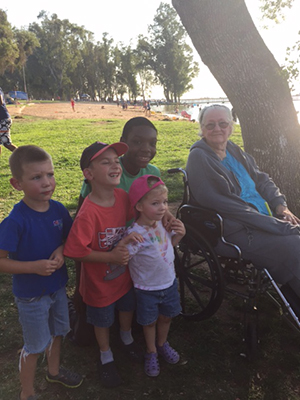
“My mother-in-law will be sharing stories with the kids about how she and Grandpa met. Then she’ll joke about how she doesn’t know where he’s run off to. She’s very sassy about it. The kids know not to correct her. They know to only ask her about her past because she can remember that.”
Aimee’s kids are working hard to make sure their grandma’s life is the best it can be for the time being. “It humbles me,” said Aimee. “It’s exhausting but it serves Val’s heart. I love it too and I wouldn’t trade it even though it’s hard. I’m proud that the kids take a stance that supports their grandma and nourishes her even in her confusion.”
Managing her paranoia
A person with Alzheimer’s may become suspicious of those around them, even accusing others of theft, infidelity or other improper behavior. While accusations can be hurtful, it can help caregivers to know that the disease is causing these behaviors and to try not to take offense.
For Bonnie, there are several things that make her paranoid. Once she starts to worry about something, it is very difficult to ease her fears. Aimee and her family do their best to help navigate Bonnie’s concerns before they escalate into something more.
“If there is a toy on the floor, Bonnie worries about people tripping on it,” said Aimee. “If a car drives, by they must be casing the joint. The red taillights of the passing car are a fire next door. It’s one of the hardest things to deal with.”
Everyone in the family does their best to make sure to clean up toys or distract Bonnie before she has an opportunity to worry about it. “We make a joke about it,” said Aimee. “We don’t want her to worry and build it into more than it is.”
Benefiting from the e-news
Aimee first learned about the Alzheimer’s Association through her profession. She participates in the Merced Walk to End Alzheimer’s and had signed up for our chapter e-news.
“I’m always surprised by all the resources. Every time I open it there’s always one more thing I didn’t know,” said Aimee. “It’s not something you read and then discard. There is always more to go back to.”
The positive side of Alzheimer’s
Aimee does her best to find the goodness in life. This is especially true now. She shared some wonderful anecdotes from living with her mother-in-law. Aimee believes that there is an opportunity to find joy and humor in caring for someone with Alzheimer’s.
My old hands
“We have a smart television. It’s amazing, we can take photos from our cell phone and stream them to the tv. It comes up as a slide show and Bonnie loves it. She sees photos of her brother-in-law, her best friend and her husband. She doesn’t realize that those are old photos.
“The other day she looked down at her hands and said “˜I need to go to the doctor. Look how old my hands are!’ The first time she did that, I reminded her she was 84 and she just looked up at us in shock and started laughing. She said, “˜You’re so funny.’ She didn’t believe us at all.”
Hours of enjoyment
“Bonnie’s favorite fruit are stone fruits, so we picked up some at the farmers market for her. She opened the bag, smelled the fruit and said, “˜Mmm, it’s my favorite.’ We talked for a little bit, then, three minutes later she asked, “˜Did you bring me something!?’ She picked up the bag and smelled it again.
“That’s one of the things that’s so sweet. She kept opening the bag and enjoying it like it was the first time, every few minutes for two hours. I just enjoy the fact that we’re delighting her again and again and again.”
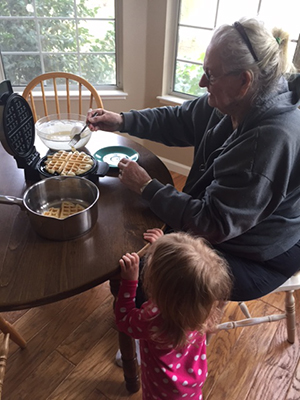
A birthday note to her mom
For Bonnie’s most recent birthday, Val wrote a note to her mom on Facebook. She talks about all the things her mom can still do and still remember.
“Today is my mom’s birthday. She doesn’t know which one. In fact, she recently got very annoyed with me when I told her her age. After experimenting a little I have discovered that she is pretty satisfied with something in the late forties, so that is what I answer now, when she asks.”
“I want to mark the day that I can make her a big stew that SHE requested for her birthday dinner. She can still enjoy a trip to town to wander around Walmart, or lunch out with the family. She kisses my kids goodnight, and gives advice about raising chickens and how to fix a leaky toilet.”
Val goes on to talk about how her mother is forgetting who she is or where she is. “One day this week, my mom was almost in tears worrying about how her mom might be mad at her for staying out so late without calling.
“She has had to ask for the fifth time today where the bathroom is, in a home that she has lived in for over 2 years.”
Despite all that is going on Val continues to celebrate the little things. “On this day though, I want to celebrate that my mom holds my hand on one side and my son’s little hand on the other side, as we come together as a family and bow our heads to offer thanks before we eat.
“I want to acknowledge how profoundly grateful I am that every night I have the privilege of helping her get ready for bed, tucking her in, getting a kiss good night and hearing her say, “˜I love you, thank you for helping me, sweet dreams.’ Happy 48th birthday mom.”
There are many ways you can adapt routines and activities if you have a loved one living with Alzheimer’s or other dementias at home. Visit our Daily Care page to learn about resources and other ideas to help make your life a little easier.
The Alzheimer’s Association e-news updates subscribers on the latest information on Alzheimer’s care and support, advances in research, as well as inspirational stories and resources for people living with the disease and their caregivers. Sign up for the enews at alz.org/enews.
Learn more:





